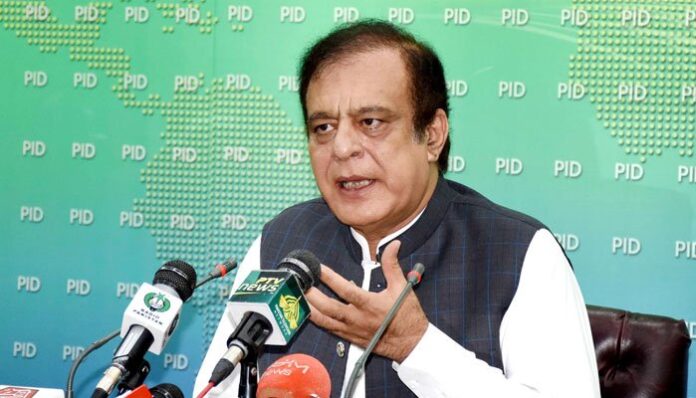ISLAMABAD: Minister for Information and Broadcasting Shibli Faraz on Thursday acknowledged that the federal government is still facing various challenges, including increasing prices, hoarding and smuggling, which he said would be addressed by the government as its top most priority.
While addressing the media along with some other cabinet members, the information minister said that Imran Khan’s 22-years of political struggle was aimed at ending corruption and politics of vested interests in the country adding that this aim is close to being fulfilled.
The information minister announced that the Pakistan Tehreek-e-Insaf (PTI) government would implement its complete manifesto by the end of its five-year term adding that giving relief to the people is the government’s top priority.
“Imran Khan is the custodian of the future of the country’s youth,” Shibli Faraz said.
While addressing the press conference, Adviser to the Prime Minister on Institutional Reforms Dr Ishrat Husain said that the Prime Imran Khan has vowed to bring reforms in all areas. However he added that it will take some time to rectify the shortcomings of the previous 25 years.
He said that shortcomings in governance is the main reason behind all crises faced by Pakistan.
Dr Ishrat added that Pakistan’s economy was growing at a fast rate from 1950 to 1990s, however the growth has slowed down due to the politicisation of institutions.
He presented four points aimed at ending the discretionary powers of the government and enabling the use of Information Technology to impart transparency and automation.
The government has reduced the number of federal government departments from 440 to 324, he said adding that 71,000 government posts that had been lying vacant for more than a year have been abolished as they were not required.
“Now we are modernising treasury rules and streamlining the law making process,” he said adding that reforms were essential in several state owned entities including the Federal Board of Revenue (FBR).
He said that the government will bring civil service reforms which will include a promotion policy.
While highlighting the performance of his ministries PTI leader Shehryar Afridi said that the three most important achievements include resolving the issues faced by the zaireens at Pak-Iran border, ending the sit-in by Hazara community of Quetta and the sit-in by Tehreek Labaik Pakistan (TLP) in Islamabad through negotiations.
He said that during his tenure as the Minister of State for Interior the interior ministry recovered 33,000 kanals of land and introduced late night raids at police stations.
He said that his ministry also achieved other goals which include visa on arrival regime, streamlining regulations for international Non Government Organisations (NGOs) and stringent measures against illegal arms.
Shehryar Afridi was previously appointed as the Minister of State for Interior and is currently the Minister of State for States and Frontier Regions.
The press conference was also addressed by the Adviser to the Prime Minister on Commerce and Investment Abdul Razzak Dawood. He highlighted the challenges faced by the government in overcoming the trade deficit and increasing exports amid the coronavirus pandemic.
He said that the government has announced incentive packages for five major export sectors while expressing confidence that exports will increase in the coming months.
Minister of State for Climate Change Zartaj Gul said that during the last two years her ministry has launched the Billion Tree Tsunami project under which 324 million trees have already been planted. She said the project has also created a large number of jobs in the country.
Similarly, adviser to the PM on Climate Change Malik Amin Aslam informed regarding the government’s achievements under the ‘Clean and Green Pakistan Campaign’.




